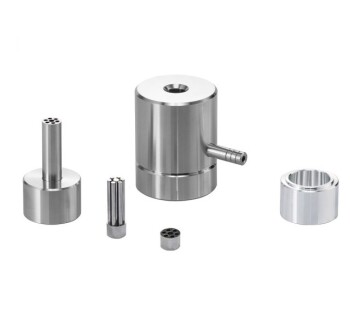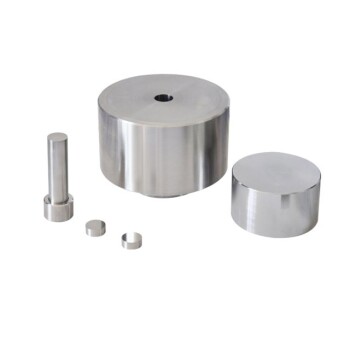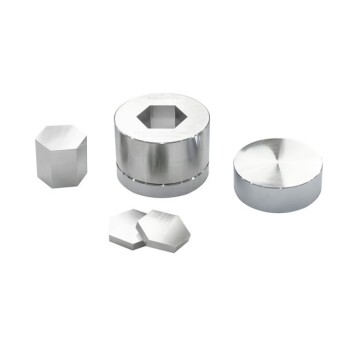At their core, lab presses are versatile tools used to precisely shape, compact, or bond materials by applying controlled force. Their primary applications span materials research, quality control, and sample preparation across industries like polymers, pharmaceuticals, and ceramics. They are essential for creating standardized test specimens, developing new compounds, and simulating larger-scale production processes.
A lab press is not just for one task; it is a foundational instrument for material transformation. Its value lies in its ability to apply precise pressure—and often heat—to convert raw or powdered materials into uniform, testable, or usable forms for research and quality assurance.

The Core Function: Transforming Materials with Precision
The fundamental purpose of a lab press is to exert a specific amount of force on a material placed between two plates, known as platens. This controlled compression allows for a wide range of material manipulations.
Sample Preparation for Analysis
A primary use for lab presses is creating consistent samples for analytical instrumentation. Inconsistent sample density or form can lead to inaccurate test results.
By compacting powders into solid pellets or films, a lab press ensures that samples are uniform. This is critical for techniques like X-Ray Fluorescence (XRF) for elemental analysis and Infrared (IR) spectroscopy.
Materials Research & Development (R&D)
Lab presses are indispensable in R&D for creating and testing new materials. They allow researchers to experiment with different formulations and processing conditions on a small, cost-effective scale.
Scientists use them to mold novel polymers, form new composites, or compact experimental ceramic powders. The data gathered provides performance guidelines before scaling up to production.
Quality Control and Process Simulation
In a manufacturing environment, lab presses serve as a quality control checkpoint. They can test the properties of incoming raw materials or finished products to ensure they meet specifications.
Because they can mimic the functions of larger production presses, they are also used to test and refine molding, forming, or laminating processes before they are implemented on the factory floor.
Key Industrial Applications
While the function is consistent, the specific applications vary significantly by industry. The addition of heated platens dramatically expands the press's utility, enabling melting and curing processes.
Polymers and Composites
In the plastics and rubber industries, heated lab presses are used for compression molding. They melt and compress polymer resins or rubber compounds into standardized shapes for physical property testing. They are also used to create thin polymer films.
Pharmaceuticals
The pharmaceutical industry relies on lab presses for compaction and pelletizing. Researchers compact powdered active ingredients and excipients into pills or tablets for dissolution testing, formulation development, and stability studies.
Ceramics and Materials Science
For hard materials, lab presses are used to compact metallic or ceramic powders into dense "green" bricks or briquettes before they are sintered in a furnace. They are also used for simple crushing and fluid extraction from porous materials.
Laminating and Bonding
Heated lab presses are used to laminate materials by bonding multiple layers together using heat and pressure. This is common in the development of composites, electronics, and even textiles.
Understanding the Trade-offs
A lab press is a powerful tool, but it's crucial to understand its intended role and limitations compared to full-scale industrial equipment.
Strength: Versatility and Data Collection
The greatest strength of a laboratory press is its versatility. A single machine can be used for molding, pelletizing, and testing across a wide range of materials.
It is designed for precision and repeatability, making it ideal for collecting valuable data on material behavior under pressure and temperature, which is essential for R&D and process validation.
Limitation: Scale and Throughput
A lab press is not a production machine. It is designed for short runs, single-specimen creation, or lean manufacturing, not high-volume output.
The process is typically manual or semi-automated, making its throughput far too low for mass production. Its purpose is to generate knowledge and quality samples, not finished goods in quantity.
Making the Right Choice for Your Goal
To apply a lab press effectively, align its use with your primary objective.
- If your primary focus is material analysis: Use the press to create highly consistent pellets or films to ensure your analytical results are accurate and repeatable.
- If your primary focus is new product development: Use the press as a small-scale simulator to test new material formulations and optimize processing parameters before committing to expensive production tooling.
- If your primary focus is quality control: Use the press to form standardized test specimens from raw materials or finished goods to verify they meet required performance standards.
Ultimately, the lab press is a foundational tool that empowers innovation by enabling precise and repeatable control over material form.
Summary Table:
| Application Area | Key Uses | Industries Benefited |
|---|---|---|
| Sample Preparation | Creating uniform pellets/films for analysis | Pharmaceuticals, Materials Science |
| R&D | Testing new materials and formulations | Polymers, Composites, Ceramics |
| Quality Control | Verifying material properties and standards | Manufacturing, Pharmaceuticals |
| Laminating & Bonding | Bonding layers with heat and pressure | Electronics, Textiles, Composites |
Ready to enhance your lab's capabilities with precision and reliability? KINTEK specializes in high-performance lab press machines, including automatic lab presses, isostatic presses, and heated lab presses, tailored for laboratory needs in materials research, quality control, and sample preparation. Our equipment ensures accurate, repeatable results to drive your innovation forward. Contact us today to discuss how we can support your specific applications and boost efficiency!
Visual Guide

Related Products
- Laboratory Hydraulic Press 2T Lab Pellet Press for KBR FTIR
- Automatic Laboratory Hydraulic Press Lab Pellet Press Machine
- Laboratory Hydraulic Press Lab Pellet Press Button Battery Press
- Manual Laboratory Hydraulic Press Lab Pellet Press
- Automatic Heated Hydraulic Press Machine with Hot Plates for Laboratory
People Also Ask
- How are hydraulic presses used in spectroscopy and compositional determination? Enhance Accuracy in FTIR and XRF Analysis
- What are some laboratory applications of hydraulic presses? Boost Precision in Sample Prep and Testing
- How is a laboratory hydraulic press used for polymer melt crystallization? Achieve Flawless Sample Standardization
- What role does a laboratory hydraulic press play in carbonate powder prep? Optimize Your Sample Analysis
- Why must a laboratory hydraulic press be used for pelletizing samples for FTIR? Achieve Precision in Spectral Data



















